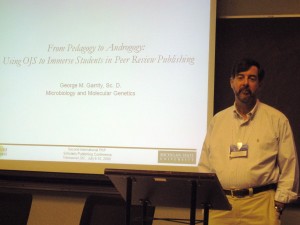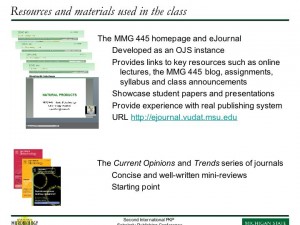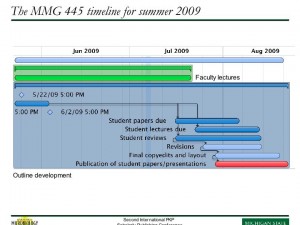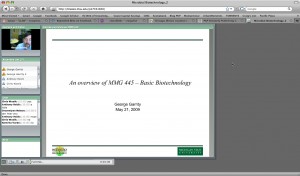From Pedagogy to Androgogy: Using OJS to Immerse Students in Peer-Review Publishing: The Session Blog
Original Abstract Title: An Online, Open Access, Student-Authored and Peer-Reviewed eJournal in Biotechnology
Presenter: George M. Garrity
July 10th, 2009 at 9:30 a.m.

(Used with permission from George Garrity)
Background info
A course (MMG 445 Basic Biotechnology) taught at Michigan State University by George Garrity has been a leader in student open access knowledge publication. The curriculum ensures its students learn the rigorous method of peer review in their field by becoming both authors and reviewers. The course and website follow Creative Commons licensing and pay particular attention to intellectual property. The students hope to be published at the end of this course after surviving the said scientific methods of journal editing and learning about biotechnology to boot.
Session Overview
The session starts with Professor Garrity describing a 20-year old course description that claims to deliver thoroughly out-of-date biotechnology topics and methods. You would think this would mean a zero percent class registration, but in contrast the class has been increasing in size every year and the university has placed a cap at 50 students! Word of mouth has ensured that this important course for all students is continued. Why is this course important you ask? Garrity goes on to explain that there are 5 essential elements students need to possess and are rarely taught in school:
- Curiosity
- Open to new ideas
- Problem solving
- Critical reading and listening skills
- Ability to express oneself clearly (written and verbal)
He continues on to describe what happens in the real world and skills you need to possess to become successful in your field:
- work on multidisciplinary teams
- be adaptable
- ability to acquire new skills quickly.
He shows how the course has changed over the 10 past years and how the course has come from a traditional lecture based series to a now completely virtual university with all lectures given online and students able to blog/chat online with each other and professor at the same time. He has instituted a blog for students to ask questions about the given weekly lecture (and this is the class participation mark). The students do not get away with mindless, redundant questions either. They will get thrown back to the students to revise.

(Used with permission from George Garrity)
The course is structured into 4 assignments:
- Review paper (topic of their choice from Current Biotechnology) 30%
- Student Reviewer (4 other student papers) 30%
- Presentation of their paper 30%
- Class Participation 10%
Garrity and invited expert guest lecturers ensure that the whole process is valid and conforms to proper methodology. They also ensure that students are true to their said interests and get the work authored and reviewed in a timely fashion. The whole process has to be completed in one academic semester (13 weeks). There is a 70% acceptance rate and students are held to high standards. He relates to the class the importance of publication and how the scientific community uses this process to communicate, gain recognition and as a tool of quality control.

(used with permission from George Garrity)
The student publications can be viewed online via the Open Journal System and have been thoroughly cited in Google scholar. These review article have been cited by other peer-reviewed articles multiple times, have been published by Elsevier and have been used in hiring interviews. Student Alumni have come back to class to give ringing endorsements of the reality of the class and well as to become teaching assistants or guest lecturers.
One of the biggest components is the no-tolerance policy on plagiarism which is painfully spelled out by Garrity in class and even goes on to tell the students how he will catch them. You would think this would turn students off of the idea, but he still gives examples of multiple plagiarized papers each semester.
As stated above the course goes beyond plenary sessions to include the above unique writing as well as faculty and student-generated online videos. They do this using Web 2.0 online programs (Adobe Connect Pro/Skype) which are similar to Jove (Journal of Visualised Experiments). Please see the YouTube tutorial below for an example of how Adobe Connect Pro works. These are easy to use and cheap to install in the classroom.
Questions from the audience
Most questions centred around plagiarism and how he could detect the multiple examples.
The shared techniques from simplest to complex were:
- multiple different fonts in a paper
- multiple writing styles in a paper
- undergrad level English/grammar forging into graduate level writing and then back again
- use of technically perfect writing, however strung together in such a way that it made no scientific sense
A specific technique he used centred around an “anchoring” word which is a word that shouldn’t be used commonly that appears. He places this word with three or four surrounding words in google and tries to find wrong citations or mis-citations. All evidences of plagiarism is reported back to the Academic Council and Dean.
Notable Accomplishments
The eJournal continues to increase in circulation with >92,400 downloads to date (Source).
Seven student articles have been downloaded > 2000 times and 23 papers over 1000 times (Source).
The eJournal has been chosen as the first place recipient in the 2007 MSU-AT&T Faculty-Staff Awards for Instuctional Technology.
Related Links
Scientific Writing Reference texts


1 comment
1 Creating an Open Access Journal; A Medical Students’ Prospective: The Session Blog — PKP Scholarly Publishing Conference Blog 2009 { 07.12.09 at 11:37 pm }
[…] started a few years earlier by the same institution (MSU) in a graduate biotechnology course, see session blog from this conference as well, (however on a much quicker timeline, around 28 […]